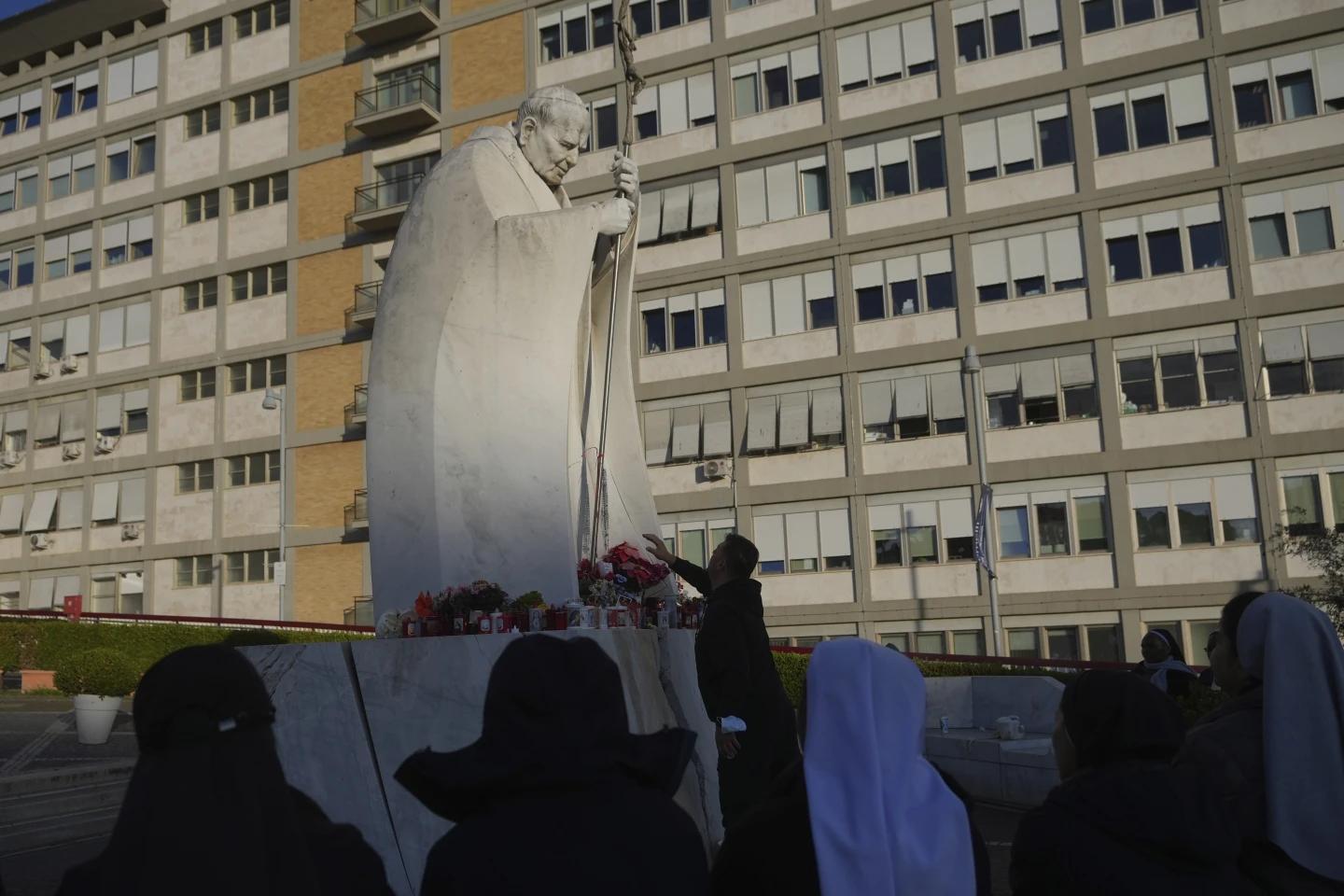ROME – After experiencing a major downturn in his condition Saturday that required high oxygen treatment and blood transfusions, Pope Francis is resting as faithful and Church leaders across the world rally in prayer.
A Feb. 23 morning bulletin from the Vatican reported that “the pope had a calm night and rested.”
The update comes a day after Pope Francis’s most serious medical crisis since being admitted to Rome’s Gemelli Hospital Feb. 14 for the treatment of bronchitis which for two weeks had left him breathless and unable to read prepared speeches.
He was later diagnosed with a complex viral, bacterial and fungal respiratory tract infection and the onset of pneumonia in both lungs, with doctors repeatedly calling his overall clinical status “complex.”
Doctors on Friday urged caution regarding the pope’s condition, telling journalists in the first press conference since the pope entered the Gemelli that while stable at the time, he was “not out of danger,” and that his situation remained complex.
They warned that the main threat Francis faced was the potential onset of sepsis, a serious blood infection that can damage the body’s organs and which can occur as a complication of pneumonia.
Alarm was raised on his condition Saturday morning when, in the Vatican’s regular morning update on the pope’s condition, it was said in the Feb. 22 bulletin that he had “rested well” during the night, but it did not specify, as it had in previous days, whether he had gotten up and had breakfast.
An evening medical bulletin later that day said the pope was in “critical” condition, and that “the pope is not out of danger.”
The statement revealed that on Saturday the pontiff suffered “a prolonged asthmatic respiratory crisis” that required the administration of high-flow oxygen. Blood tests that day also revealed a low blood platelet count, called thrombocytopenia, which required blood transfusions.
The pope, 88, suffers from chronic lung disease and is especially prone to bronchitis in winter, having suffered from the condition with increased frequency in the past two years.
Dr. Sergio Alfieri, the director of medicine at the Gemelli Hospital in Rome, said Friday that the onset of sepsis, given the pope’s age and weakened respiratory tract, explaining that “sepsis, with his respiratory problems and his age, would be really difficult to get out of.”
Doctors Saturday night described Pope Francis’s prognosis as “reserved,” meaning it was still possible he could recover, but it was also unclear whether he would survive.
On Sunday, Italian media reported Vatican sources say there were no further blood transfusions, and Francis has not been intubated in any way. However, the pope has not had any visitors.
While Pope Francis’s condition remains critical, bishops and faithful around the world have rallied in prayer through social media campaigns and local liturgies and prayer initiatives.
In Rome, various groups of faithful as well as priests and seminarians from around the world studying in Rome have been lighting candles and praying the rosary at the base of a large marble statue of Pope Saint John Paul II, who was admitted to the Gemelli Hospital a total of seven times in his nearly 27-year papacy.
Cardinal Baldassare Reina, the vicar of Rome, has announced that he will celebrate a special Mass on Sunday, Feb. 23, for the intentions of Pope Francis, whose most common appeal to faithful is to “don’t forget to pray for me.”
The Mass will take place at 5:30p.m. local time at the papal basilica of Saint John Lateran in Rome, which is the headquarters of the Rome vicariate and is the pope’s official see.
In a communique announcing the Mass, Reina also invited other priests to celebrate Mass at the same time, so the Church is united in prayer for the pope, saying, “I wish to invite you to unite spiritually in the Holy Mass that I will celebrate this evening.”
“In communion in faith and prayer, each one in their own community, will raise our prayer to the Lord for the Holy Father, so that he sustain him with his grace and fill him with the strength necessary to get through this moment of trial.”
Raina offered several suggestions for intentions that can be added to the universal prayers during Sunday’s Mass.
These intentions include praying that “the God of life sustain our Pope Francis: give him relief in body and in spirit,” and, “Good father, who cares about the lives of all of your children, look kindly upon your servant and our Pope Francis, so that, recovered in his health, he may continue his mission in the service of the Church.”
Other possible intentions Reina proposed are, “For our Pope Francis: may he experience the loving presence of the Risen Lord and the supportive closeness of the Christian community,” and that, “Salvation of believers and refuge of the afflicted, comfort our Pope Francis so that, with the help of your mercy, he may find relief in his suffering.”
Doctors in Saturday night’s medical bulletin said the pope continued to be alert and had spent the day in a chair in his room, “even if he was in more pain” than previous days.
Other than having a restful night, no other information on his condition was provided in Sunday’s morning update. Further information on his medical condition is expected Sunday night.
This story has been updated.
Follow Elise Ann Allen on X: @eliseannallen











